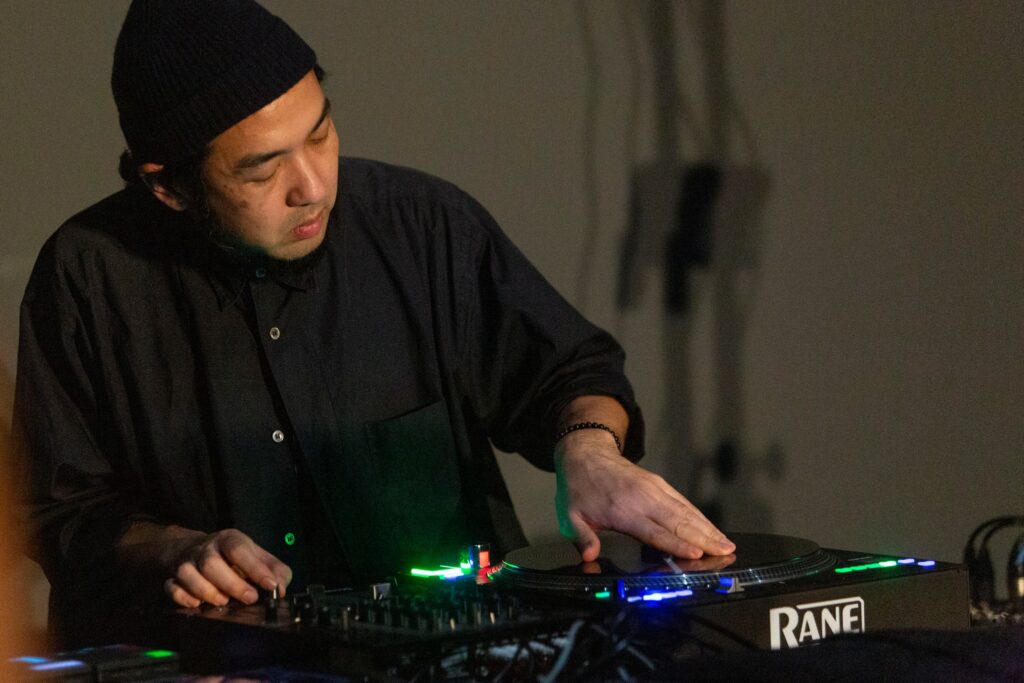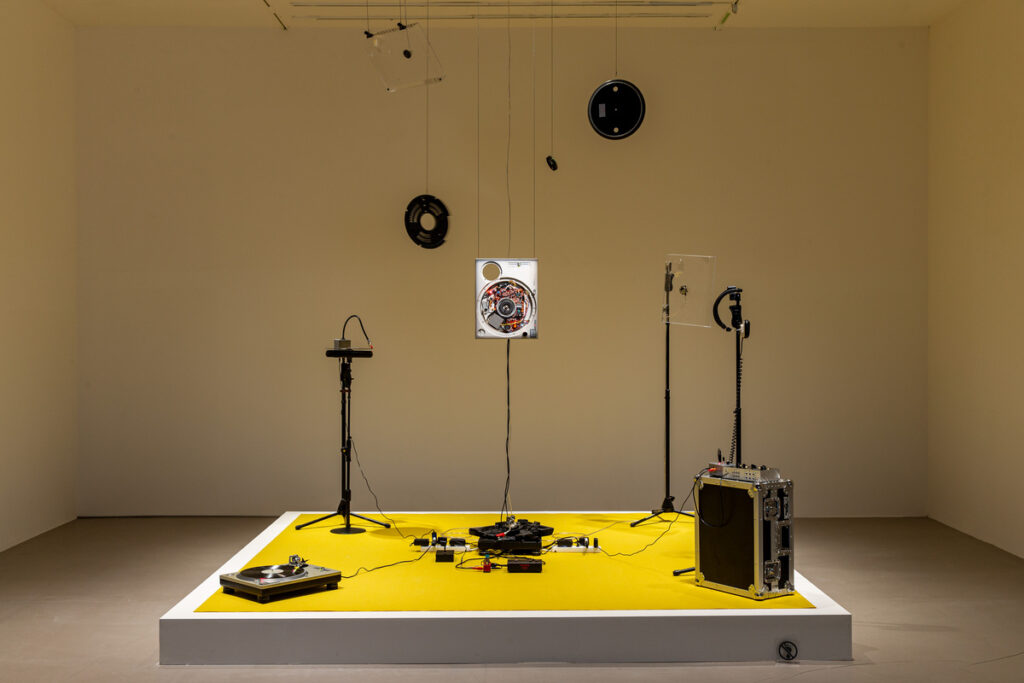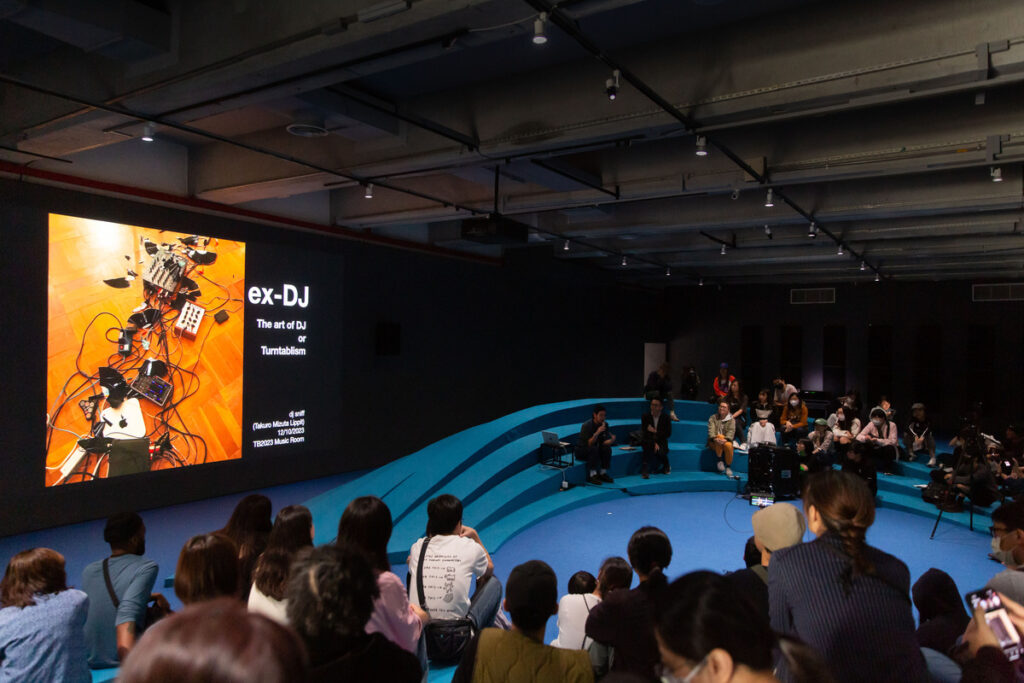Music and its diverse expressions played a pivotal role in shaping the atmosphere of Taipei Biennial 2023, contributing not only to its cultural vibrancy and performative tension but also offering a unique contrast to the traditional modes of engagement associated with visual art.
Throughout the duration of the exhibition, the Biennial curated three distinct groups of musicians and sound practitioners, including dj sniff from Los Angeles / Tokyo, Julian Abraham (Togar) & Wok the Rock from Yogyakarta, and Ting Shuo Hear Say from Tainan. These artists were invited to lead specialized programs within the Music Room segment of the Biennial, dedicated to collective gatherings, recording sessions, jamming, and music programming.
We were thrilled to have the opportunity to sit down with the innovative turntablist and co-director of AMF (Asian Meeting Festival) Takuro Mizuta Lippit a.k.a. dj sniff, to discuss his new installation “Transformer” and his creative process of sound exploration and Asia’s position in the international realm of experimental music and art.

dj sniff at "ex-DJ" Music Room Program of Taipei Biennial 2023 (Photo by courtesy of Taipei Biennial 2023)
-You began in the sphere of DJing but eventually moved to performing live experimental music, what inspired you to move in this direction? What role do you take when DJing versus making experimental music and art? How have these two approaches fed into one another?
I initially grew up listening to hip hop, but my journey into DJing began in late 90s Tokyo, a time when techno was rising in prominence. I found myself deeply moved by the techno scene, contrasting with the conservative and hierarchical nature of hip hop, soul, and jazz scenes, where apprenticeship was paramount and entry often required carrying someone else's records. On the other hand Techno was much more welcoming, cultivating a sense of inclusivity and camaraderie. Thus, I delved into DJing techno, later transitioning to house music, and eventually exploring a diverse range of genres.
Initially, my focus as a turntablist didn’t lean towards scratching; instead, I gravitated towards the mixing equivalent, exploring how I could exhibit this skill in a less overtly performative manner. My passion lay in mastering the technical aspects of DJing. I wanted to be able to transition music from 80bpm to 160bpm through mixing. It wasn't until later that I began contemplating how to evolve from being solely a DJ to a performer, where I started to delve into crafting my own instruments, programming and incorporating scratching into my performances.
My fascination with improvised music blossomed after relocating to Europe; prior to my move, I had already developed a sampling system designed for solo performances. There, I discovered this vibrant free improv scene that I really liked. Witnessing musicians create music spontaneously onstage was truly inspiring. However, when I attempted to collaborate with them or join their jam sessions, I found that my existing tools were too sluggish to keep pace with the spontaneity of their performances.
When performing solo with my samplers, my process involved playing a sound, sampling it, adjusting it, and replaying it. However, in improvisational settings, speed is crucial. Therefore, my desire to collaborate with new musicians drove me to re-adapt my tools and create new ones that allowed for quicker responses. Additionally, I immersed myself in the language of free improvisation, recognizing its distinct aesthetics and improvisational approaches, which greatly influenced my own style.
-Your Installation "Transformer" is described as a homage to Grandmaster Flash. The disassembled record player coupled with sustained amplified hums of the equipment, creates a quasi-choral resonance and a somewhat divine or ritualistic ambiance. How does this installation align with this year's biennial theme? Were there any innovative approaches or elements you explored in creating this installation compared to your previous works?
The perspective that I wanted to offer the Biennial and its theme was, that although DJing and hip hop are part of the “large world” of popular music, embedded in these are strongly interconnected niche communities with specific aesthetics and values. Moreover, I consider these underground music scenes to be the foundation and undercurrent to any kind of mainstream culture. For my installation, Transformer, I wanted to address how Grandmaster Flash's innovations that later shaped hip hop were made through a dialog with sound technology. The hum you hear in my work is the sound of the electrical current passing through the transformer of the technics turntable. This sound passes through a DJ equipment that Grandmaster Flash designed in 1988 called Flash Former, which was a device that allowed anyone to play the “transformer” scratch. My artwork often deals with historical narratives and word associations that lead to modifying common electronic devices.

Transformer (2023) by dj sniff (Photo by courtesy of Taipei Biennial 2023)
-In this year’s Taipei biennial the title of your music room curation is titled “ex-DJ”, which brings together three other turntablists DJ Rex Chen, Mariam Rezaei and SlowPitchSound who are all positioned outside traditional DJ practice. How did you select the three artists and what commonalities do you share in listening and performance?
There's a clear division between experimental turntablism and hip-hop turntablism, each with its own distinct aesthetics and rules. Those of us I've gathered this time tend to navigate somewhere in between. We draw influences from both sides but don't strictly adhere to either a distinct style or aesthetic. As a result, we don't quite fit within those defined categories, making us outsiders in that sense.
I think the four of us are still very much a student of DJ culture and everything related to DJing and turntablism. We possess a broad awareness of both DJ culture, experimental music and sound. As DJs, it's natural to be obsessed with sounds and histories because you are constantly digging through records and maintaining an analytical perspective on music. In that regard, the artists I've invited this time embody the essence of being DJs and turntablists in a pure sense.
I believe one of the driving factors behind becoming a DJ is a profound interest in music and the act of playing it, prompting a desire to explore every aspect, from the record covers to understanding how the needle produces sound as it spins. It's about uncovering the different types of DJs and analyzing their techniques. There's a certain obsession that accompanies this exploration. Although I had only briefly known Rex and had met Mariam and SlowPitchSound for the first time for this event, we immediately clicked and this confirmed my belief.
-In Asia, musicians frequently encounter challenges in gaining recognition on global platforms, often attributed to the limited exposure caused by language barriers between the East and West. The Asian Meeting Festival aims to address this issue by spotlighting overlooked music scenes, identifying key figures, and fostering a collaborative network among experimental musicians and organizers. Reflecting on the past decade, what notable developments have you observed, and what do you foresee for the future of this initiative in the coming years?
AMF was initiated with the aim of developing connections among diverse artists, communities, and audiences within the realm of experimental and improvised music in Asia. Initially spearheaded by Otomo Yoshihide from 2005, my colleague Yuen Chee Wai from Singapore, and myself took over as co-directors in 2014, as we recognized the presence of numerous isolated music scenes scattered throughout Southeast Asia, each with its own community of musicians, organizers, and venue operators. Our goal was to establish a network bridging these pockets of creativity. Over the course of five years, we found considerable success in uniting these communities and providing support.
One noteworthy observation about the Asian music landscape is the lack of communication between artists in neighbouring countries, such as Japan and Korea, Thailand and Vietnam, or Malaysia and Indonesia. This phenomenon partly stems from a prevailing mindset among aspiring artists that true career validation comes from showcasing their work in Europe or the US, rather than within their own region. Consequently, domestic recognition often takes a backseat to international acclaim. Through our efforts, we aimed to highlight the value of collaboration with partners in Asia, challenging this mindset.
However, the onset of the COVID-19 pandemic significantly disrupted our work, causing many of our initiatives to falter. Now, as we navigate through this challenging period, it has become evident that we need to reassess the landscape, conduct further research, and revisit these communities to understand their current circumstances.

“ex-DJ” Music Room Program featured artist talks, roundtable discussions, and concerts (Photo by courtesy of Taipei Biennial 2023)
-Alternatively it might be a gnarly subject matter but we can’t dismiss the fact that it is evident. Concerning the media landscape, numerous smaller Asian nations are compelled to leverage their cultural exoticism as a strategic tool. Do you think there's a way to reduce this emphasis and shift the focus solely to the sonic output? Or do you believe that improvised music in Asia is intricately tied to traditional practices, necessitating verbal explanations for listeners to gain a deeper understanding?
On one side, there's a strategic push for this approach. During my time working in Amsterdam, I noticed a significant emphasis on funding and themes surrounding non-Western art, often steeped in exoticism. There's a preference for traditional over modern or Western art forms. Consequently, the platforms and financial support offered are often more substantial than what one might receive in their home country, with perceived opportunities for touring major festivals. However, having gained a better perspective on this dynamic, I've become increasingly skeptical. While the immediate financial gain might be enticing, it's clear that individuals in these positions are easily replaceable, rendering such opportunities unsustainable.
Participating in European festivals doesn't necessarily facilitate obtaining a visa to stay in Europe, which is a desire for many artists. Moreover, it doesn't guarantee increased income or job prospects within their own region. Instead, artists often find themselves fitting into predefined programs or themes, with little consideration for their long-term aspirations or sustainability. I've grown impatient and intolerant of this consumption-driven approach to non-Western cultures. While there may be a reliance on European funding, investing in local connections and those within neighboring Asian countries is ultimately more conducive to building lasting, sustainable careers. In the long run, it ensures a continuous stream of opportunities and activities, rather than being subject to the whims of shifting thematic trends in European programming.
Regarding the concept of Asian identity, it's important to recognize that it varies significantly from one country to another. As I was discussing with Rex, personally, incorporating Japanese influences into my music doesn't feel natural. This sentiment stems from my upbringing in various cultures and the fact that in Japan, traditional practices were somewhat disrupted during modernization. However, in places like Vietnam, all the improvisors come from traditional practices. Improvisation holds great significance, especially in contexts like theater music. Thus, for Vietnamese musicians, integrating traditional instruments and themes into free improvisation feels inherently natural.
In Indonesia, groups like Senyawa draw upon rituals and Javanese culture, partly for strategic reasons but also as a form of protest. For the younger generation, actively incorporating these elements connects them to forms of activism during times of dictatorship when indigenous cultures were suppressed.
Each Asian country has its unique relationship with tradition. While we critique the tendency of European cultures to exoticize Asian traditions, it's also essential not to generalize the use of traditional themes across different cultures. Each context demands careful consideration and understanding.
-You have traveled to Taiwan multiple times to exhibit your work, performed at the Sonic Shaman festival and hosted the Asia Meeting Festival in 2018. What instills your returning visits?
My initial visit to Taiwan was in 2012, and over the past 12 years, I've returned around 10 times. The reason for my frequent visits comes from the lasting impression I had during my first encounter with the country. I was deeply moved by the hospitality, acceptance, and warmth of the people here. Having lived a transient lifestyle, traveling extensively and residing in various places, you never forget acts of generosity which often come from people you barely know.
I was first invited by Wang Furui to talk at his university and perform in a concert and I encountered a vibrant and welcoming community. They were knowledgeable about my work and its broader context, which prompted me to realize that I knew relatively little about them in return. This realization fueled a desire to engage in meaningful dialogue and to create work that speaks directly to this community.
As a result, I've explored themes related to Japanese colonial history in Taiwan, recognizing it as a topic of mutual relevance that allows for fruitful conversations and exchanges. This longing for a deeper connection with the people I engage with has been a driving force behind my numerous return visits to Taiwan.
Full Documentation of "ex-DJ"
https://www.taipeibiennial.org/2023/content/musicroom-01





